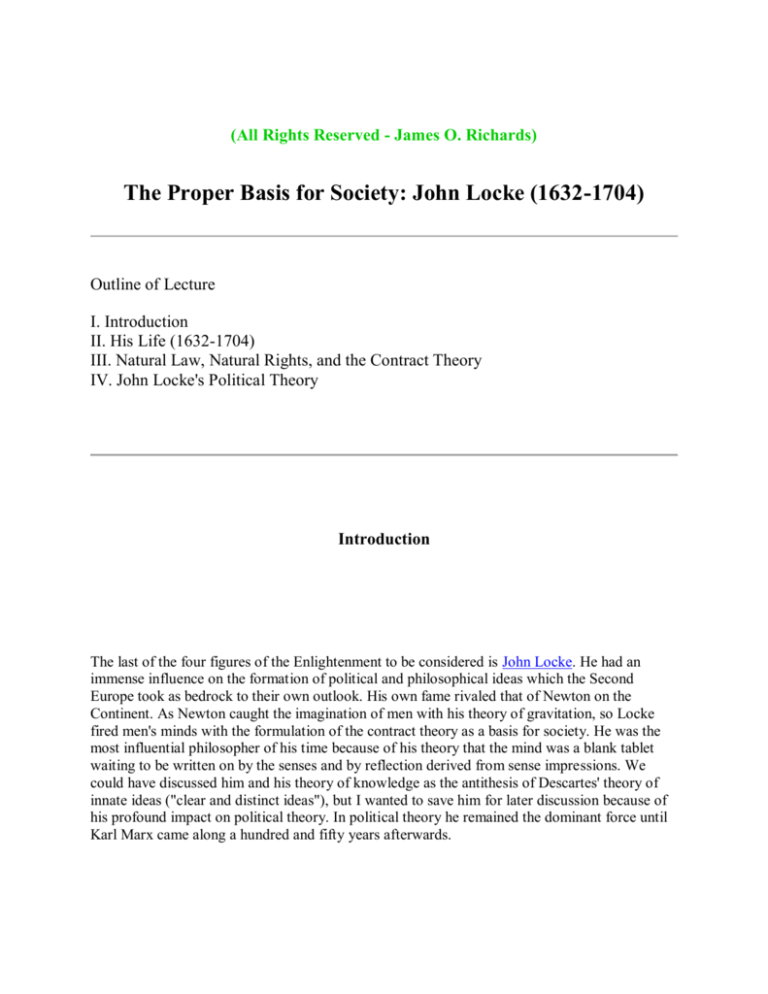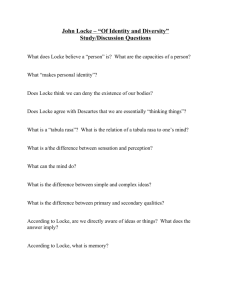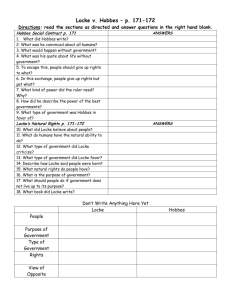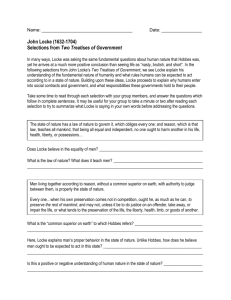
(All Rights Reserved - James O. Richards)
The Proper Basis for Society: John Locke (1632-1704)
Outline of Lecture
I. Introduction
II. His Life (1632-1704)
III. Natural Law, Natural Rights, and the Contract Theory
IV. John Locke's Political Theory
Introduction
The last of the four figures of the Enlightenment to be considered is John Locke. He had an
immense influence on the formation of political and philosophical ideas which the Second
Europe took as bedrock to their own outlook. His own fame rivaled that of Newton on the
Continent. As Newton caught the imagination of men with his theory of gravitation, so Locke
fired men's minds with the formulation of the contract theory as a basis for society. He was the
most influential philosopher of his time because of his theory that the mind was a blank tablet
waiting to be written on by the senses and by reflection derived from sense impressions. We
could have discussed him and his theory of knowledge as the antithesis of Descartes' theory of
innate ideas ("clear and distinct ideas"), but I wanted to save him for later discussion because of
his profound impact on political theory. In political theory he remained the dominant force until
Karl Marx came along a hundred and fifty years afterwards.
His Life (1632-1704)
Locke was the son of a Puritan lawyer born near Bristol in the west of England. He grew up in
the atmosphere of revolution. He was 17 when Oliver Cromwell and the Puritans executed
Charles I and the event had a profound impression on his political philosophy. After taking
degrees at Oxford, he remained as a don for a while, lecturing and tutoring. He studied medicine
but did not take a medical degree until 1674. At the same time he was studying philosophy and
working with Robert Boyle, a chemist, physicist, and one of the founders of the Royal Society.
In 1667 he became physician to one of the king's ministers, the Earl of Shaftesbury and was
drawn into political life. When Shaftesbury fled abroad in 1680 to escape arrest on the charge of
plotting revolution, Locke was so suspected of hostility to the crown that spies monitored his
lectures. He too was forced into exile in 1683. He remained there until 1689 when he returned as
a supporter of William III who replaced James II in the Glorious Revolution of 1688. Within the
year (1689-90) he published three of his most important works: a Letter on Toleration in which
he argued in Enlightenment fashion for religious toleration for all except Roman Catholics and
atheists; Two Treatises on Government which set forth the contract theory as a basis for society;
and the Essay on Human Understanding which asserted that infants have no innate ideas and are
formed and shaped by their environment. These works made him a famous man. In 1693 he
published Concerning Education, a work which put the pupil's interests as the central concern of
education and made the formation of mind, body and character of equal weight. In 1695 he
published The Reasonableness of Christianity as Delivered in the Scriptures. While not Deist in
that Locke accepted the divinity of Christ, the work aimed to show that Christianity and reason
were in perfect harmony and that the truths of the faith could be accepted on logical, natural
grounds: "the works of nature in every part of them sufficiently evidence a Deity." From 1690
until the end of his life in 1704 Locke enjoyed a number of official posts as rewards for his
support of the new monarchs. As befitting their joint impact on the Enlightenment, he became a
close friend of Isaac Newton whom he helped reform the coinage.
?
1. A little known sidelight to Locke's career is that as Shaftesbury's physician he supervised an
operation on his patron to remove a cyst on the liver. The patient lived for another 15 years!
2. Locke's theory about the child being the center and purpose of education?
3. "The works of nature in every part of them sufficiently evidence a Deity." True?
4. Another aspect of Locke's career was his being a shareholder of the Royal Africa Company
which had a monopoly of the British slave trade. I'm interested not just in your reaction to this,
but also in whether you think we can judge people of the past by current standards of right and
wrong. Some seem to think so. If you do, what are your (logical) arguments?
Natural Law, Natural Rights, and the Contract Theory
By way of setting the context in which Locke wrote his Second Treatise on Government, the
great political testament of the Second Europe, we should look first at the concept of natural law
and natural rights on which Locke based his work. A distinguishing feature of the
Enlightenment, as we saw in an earlier session, was the conviction that the world was orderly
and rational--that it was governed by fixed permanent laws. These laws had been instituted by
God, but depended on him only for their beginning. The world was like a gigantic clock which
God the clockmaker had built, wound up, and which had run since then without any further
attention from God. These laws governing the universe were called natural laws. This concept
was not new with the Second Europe. The Middle Ages, or First Europe, had also had a
conception of natural law. And both drew heavily on Stoic thought about natural law. But the
Enlightenment's conception of natural law had an immediateness the Middle Ages and Stoicism
did not have because it accorded so well with the 17th and 18th century view of the world. This
world, as revealed by Newton, was seen to be based on scientific laws. And reason, which man
alone of all beings possessed, lay at the ground of this natural order.
If man possessed reason, this presupposed certain things about man. As a being endowed with
the ability to think and choose, he also possessed dignity and worth. He possessed natural rights.
No one has put it so well as Thomas Jefferson who got his ideas from Locke and Enlightenment
thinkers, but said them better:
We hold these truth to be self-evident, that all men are created equal; that they are
endowed by their creator with certain inalienable rights; that among these are life,
liberty, and the pursuit of happiness. That to secure these rights governments are
instituted among men, deriving their just powers from the consent of the
governed.
Natural rights were fundamental axioms, "self-evident", needing no further analysis and in no
need of demonstration. They expressed the essence of man and the very character of human
reason. Reason not only ruled the universe, not only constituted the governing principle in
Nature, but also in the social life of man.
This being the case, it seemed reasonable that society would have begun as a free act of the will.
Men, free by virtue of the possession of reason, must have created the state in a logical way by
contracting among themselves to submit to government. However given, the free consent of all
parties was given and the state came into being. This view of the origin of the state, we should
hasten to add, is a logical view of the state's origin, not a historical explanation. So the ground on
which society is laid is a political or social contract.
John Locke's Political Theory
Locke wrote his two Treatises on Government against the background of natural law, natural
rights, and the contract theory. Written in the early 1680's, these works were published in 1690 to
justify the Glorious Revolution of 1688 which overthrew the Roman Catholic James II and put
on the throne Protestant William III and Mary. Locke had supported the cause of William and
Mary and explained the Revolution as a right to revolution. In the preface to the Two Treatises
he wrote that the intent was “to establish the throne of our great restorer, our present William III;
to make good his title in the consent of the people . . . and to justify to the world the people of
England, whose love of their just and natural rights, with their resolution to preserve them, saved
the nation when it was on the brink of slavery and ruin.” The First Treatise was designed to
demolish the arguments of those like Sir Robert Filmer who supported the theory of divine right
monarchy. According to this theory God had ordained the rule of kings. They were responsible
only to him for their rule and could not be resisted by their subjects even when they ruled
despotically. Locke tried to show that this theory was based on neither sound Scripture nor logic.
In the Second Treatise he turned to the true foundation for government, the consent of the
governed.
Locke began his quest for political legitimacy by defining political power:
Political Power, then, I take to be a right of making laws, with penalties of death,
and consequently all less penalties for the regulation and preserving of property,
and of employing the force of the community in the execution of such laws, and
in the defense of the Commonwealth from foreign injury, and all this only for the
public good.
This power and the government wielding it come into being as a result of a contract made by
persons who previously had lived in a non-political condition--the state of nature.
Locke was not the first to have spoken of a contract theory. Thomas Hobbes (1588-1679) had
earlier developed a theory of this sort. But Hobbes fundamentally differed from Locke in his
view of what condition men lived in before they created society and why they created society.
Hobbes said the state of nature was the state of war, each man for himself, no law, no order, and
no safety for life or property. And men entered into society to escape from the state of war.
Locke was more optimistic about what things had been like. His state of nature was
a state of perfect freedom to order their actions, and dispose of their possessions
and persons as they think fit, within the bounds of the law of Nature, without
asking leave or depending upon the will of any other man.
This state of nature is not a state of absolute freedom. The state of nature has the law of nature to
govern it
which obliges everyone one, and reason, which is that law, teaches all mankind who will
but consult it, that all being equal and independent, no one ought to harm another in his life,
health, liberty, or possessions.
As Hobbes and Locke differed about the state of nature, so did they about the type of contract
created by man and the rights retained by those who created it. For Hobbes man gave up all his
rights on entering society to an all-powerful sovereign because he was in such a miserable state
in nature. He wanted safety and protection from the passions and lusts of other men and was
willing to give up his rights to get order and safety. Locke believed that man created society for
different reasons. Man wanted, first, an established and promulgated law. He wanted a judge to
make determinations according to this law. And he wanted an executive to carry out these
determinations. He hoped to gain these three advantages by entering into the social contract. But
he did not give up all his rights in making this agreement.
But though men when they enter into society give up the equality, liberty, and the
executive power they had in the state of nature into the hands of society, to be so
far disposed of by the legislative as the good of society shall require, yet it being
only with an intention in everyone the better to preserve for himself, his liberty
and property; (for no rational creature can be supposed to change his condition
with an intention to be worse) the power of the society or legislative can never be
supposed to extend farther than the common good; but is obliged to secure
everyone's property by providing against those three defects above mentioned that
made the state of Nature so unsafe and uneasy....
And so the actual beginning of society occurred as follows:
Men being, as has been said, by nature all free, equal, and independent, no one can be put
out of this estate and be subjected to the political power of another without his own
consent, which is done by agreeing with other men, to join and unite into a community
for their comfortable, safe, and peaceable living, one amongst another, in a secure
enjoyment of their properties and a greater security against any that are not of it.
The concept of property is very important in what Locke says about the origin of society.
How does one justly acquire property? One owns his own body. He owns whatever he finds
unclaimed by anyone else: whatever he picks up, fences in, or cultivates. He owns any increase
this property yields. He owns what he gains by exchanging this property with another. Finally, he
owns any property given him by others who rightfully own it. Locke says the reason for the
existence of society is the protection of property: “Government has no other end but the
preservation of property.” By property Locke means not only land or goods, but anything that is
a man's own. Man is born free with a title to perfect freedom and the unrestricted enjoyment of
all the rights and privileges he has been granted by the laws of nature. He has the right to
preserve his property--life, liberty and estate--against any one who would take them from him.
Whether divided equally or unequally, property is hallowed, the foundation of the natural order:
“The supreme power cannot take from any man part of his property without his consent.”
Thus if the state attempts to take his property, man has the right to resist, the right to revolution.
Who decides when revolution is legitimate? And how many does it take to decide? The people
shall decide, Locke says, apparently believing that this will occur as a natural process in the same
fashion as Adam Smith’s unbidden “invisible hand” directs men’s economic interests towards
the greatest good for the greatest number.
?
1. Right to revolution? That sounds like a terrorist speaking. Your arguments for or against?
2. Property as a natural right? How fundamental is this right? Do freedom and property rights go
together?
3. What would Locke have said about the Supreme Court of the U. S.’s decision in Kelo vs New
London?
4. Was Locke as a shareholder in the Royal Africa Company being cynical when he spoke of the
rights to life, liberty and property?
5. Contrast Locke's theory of the theoretical basis for the state with the theory of modern radical
Islamists who posit Allah as the true basis for society. And what are the implications of the latter
theory for natural rights of life, liberty and property?
The Declaration of Independence (1776) echoes Locke with the exception that property has
become "pursuit of happiness":
We hold these truths to be self-evident, that all men are created equal; that they
are endowed by their creator with certain inalienable rights; that among these are
life, liberty, and the pursuit of happiness. That to secure these rights governments
are instituted among men, deriving their just powers from the consent of the
governed; that whenever any form of government becomes destructive of these
ends, it is the right of the people to alter or abolish it, and to institute a new
government, laying its foundation on such principles, and organizing its powers in
such form as to them shall seem most likely to effect their safety and happiness.
Natural Law, Natural Rights, and the Social Contract Theory are all here in Locke. I selected him
for a closer look because he best illustrates these basic ideas and assumptions of the Second
Europe and constitutes the direct source of revolutionary liberal-democratic ideals.







